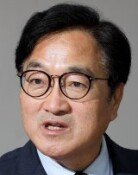Catch the Elementary School Teachers
Catch the Elementary School Teachers
Posted October. 23, 2003 22:56,
The age limitation for teaching applications according to the official announcement of the elementary school teacher employment examination for 2004, set forth by the 16 municipal and provincial offices of education on October 23 has been downgraded. The Kyungbuk province limitation of age went from 55 to 45, about 10 years younger from those of last year. The chief of each office takes charge of laying it down.
It has been made clear that according to the recent decision by the court, it allows an elementary school teacher to apply for an employment examination without walking out of ones current job. It is the countermeasures job to block up the current teachers exodus to other places.
As for the Kyungbuk and Kangwon provinces, ages went from 50 to 45 of last year, Chungbuk province, from 55 to 50, Chunbuk province, from 45 to 40, respectively. As for Seoul, Busan, Daegu, Inchoen, Kwnagju, and Daejeon, they decided on the age of 40 as their limit.
In particular, as for the Kyungki province, which needs to address for 2900 elementary school teachers this year, has lowered the age of limitation from 50 of last year to 40 for this year.
Having the official announcement just ahead, the chiefs of education in many rural areas such as Kyungbuk, strongly requested the lowering of age limitation to the education office of Kyungki province because it is highly expected that many teachers of the countryside district will apply for schools in urban areas such as the Kyungki province.
In the case of the Kyungbuk province, about 1000 elementary school teachers will try to move out of the district.
Exhibition of elementary school teacher for the rural area - When the rapid speed railway opens up, it will take only an hour from Seoul to Chungnam. The Daejeon-Dangjin highway will carry passengers in an hour inside the province. The administration capital will move in Chungnam in the near future. Choenan-Asan district is just same as the Seoul metropolitan district.
On October 23, 11 a.m., the 2004 Elementary School Teacher Employment Exhibition, held at the Gongju National University of Education in Chungnam, resembled a real estate investment attracting exhibition. As of September 2003, the Chungnam provincial office of education is lacking 1261 elementary school teachers. They focused on the fundamental life condition in Chungnam, which is better than other areas, flaring up to attract teachers.
The children are looking for you to come. Please apply for the exam, implored the chief of elementary education department in the Chungnam provincial office of education, however, nobody took a deep interest in it.
In order to gather up as many students to take part in this exhibition as possible, Gongju educational university declared a no-lecture day, but only 70 students out of the 520 students who was supposed to graduate in 2004 took part in the exhibition. Half of the participants took off during the exhibition.
The Chungnam educational office brought forth many special options such as a chance to work oneself up into the special educational job, such as a school commissioner, and free choice of ones own working school, if placed in the top 15 percent of the exam.
We are in high sense of duty. Many good options also attract us. But, only in the urban areas, where we can enjoy the benevolent of the cultural facilities, said Jang Hye-ran (29), a student of Gongju educational university, department of mathematics.
Other provincial offices of education in the rural areas suggested many special advantages to attract the teachers, but it is not an easy task for them to sort out the shortage of the teachers.
doyoce@donga.com boriam@donga.com







